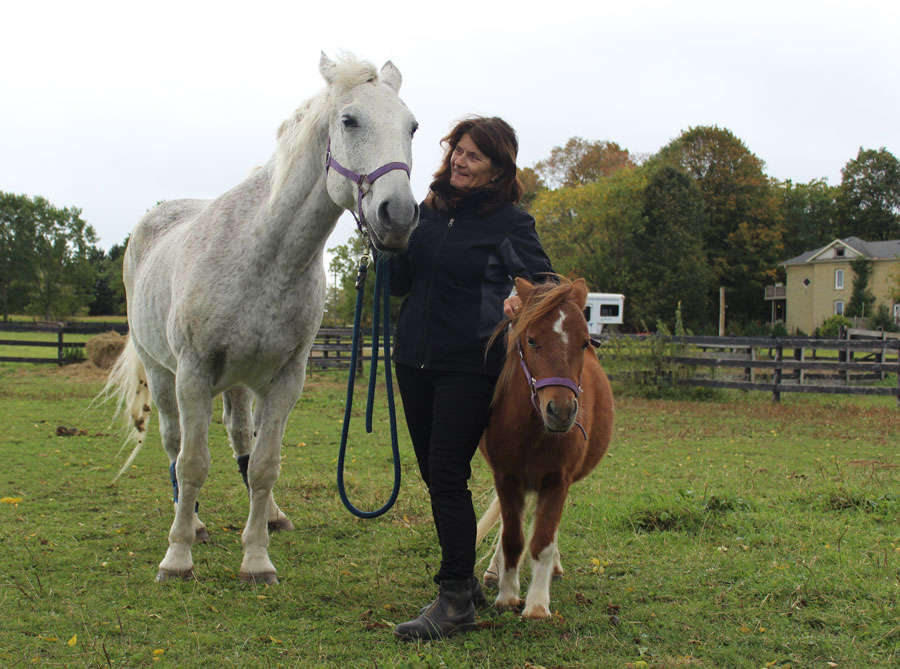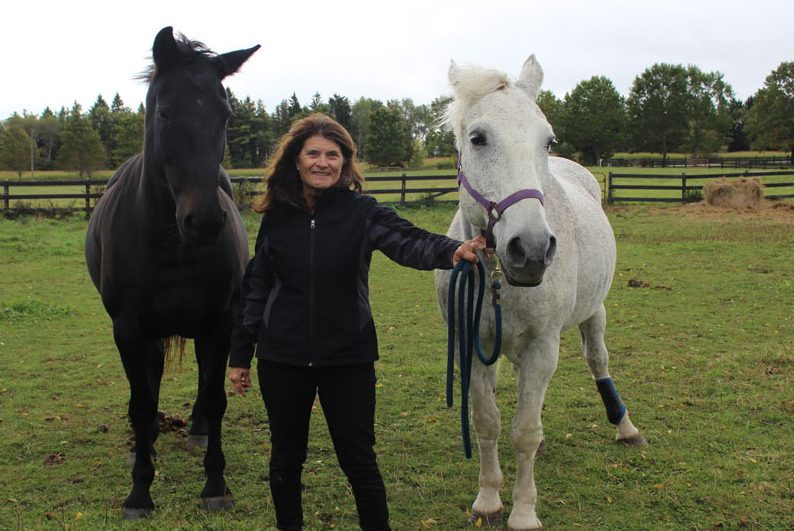PUSLINCH – Irish Creek Stables temporarily closed its doors to stop the spread of a deadly virus earlier this year.
Five horses lost their lives during the equine herpesvirus myeloencephalopathy (EHM) outbreak at the small equestrian facility, and one senior horse is still suffering with symptoms.
EHM is a mutation of equine herpesvirus-1 (EHV-1).
From early January until mid-March the stable was under a voluntary quarantine.
Though visitors were not allowed in and no riding took place, the barn was busy.
Managing and recovering from the virus was a team effort, said Irish Creek Stables owner and manager Liz Lewis during an interview at the farm on a crisp autumn morning.
She commended members of the local horse community, who pitched in with donations, support and words of encouragement.
Medications to treat the outbreak cost about $11,000, and were completely covered by the “Help for Irish Creek Stables” GoFundMe campaign.
“Nobody was unkind or pointing fingers,” Lewis said.
“The boarders would say, ‘We don’t blame you, you’re doing the best.’”
Lewis has been open about the outbreak from the beginning because she wants other stables to learn about the virus and how to protect their horses.
“It’s not shameful when horses get sick,” she said.
Continued vigilance
Lewis remains on high alert for unusual behaviour from the horses, and notes it’s important for people to look for more than just lameness and injuries.
She constantly monitors mood and general demeanor, and if anything seems off, she doesn’t hesitate to head out to the field to investigate.
If a closer inspection confirms behavioural changes, Lewis brings the horse in the barn to isolate and checks its temperature.
She also harrows the fields regularly to keep weeds down – this reduces risk of parasites and supports horses’ general health, reducing their risk of succumbing to viruses like EHV-1.
For Lewis, the long hours are not just a job, but a lifestyle – “you don’t get rich, it’s just passion,” she said with a chuckle.
Lasting impact
The EHM outbreak had a significant financial impact on Irish Creek Stables.
In addition to the cost of medication, Lewis faced a loss of income from canceled lessons, and she had to hire additional staff to manage the outbreak response.
Her utility bills were high from the hot water used for disinfecting and from how often lights needed to be on. She also had to purchase thermometers, personal protection equipment and sanitation supplies.
The outbreak’s impact was psychological too.
“It was emotionally pretty difficult watching those horses be euthanized [and] removing their dead bodies,” Lewis said, admitting the outbreak was quite traumatizing.
“I felt so down and devastated,” she said.
After 47 years of running a successful equine facility, she decided to sell the farm. But after putting it on the market, Lewis realized she didn’t want to sell.
“I’ve just been here so long – I know I don’t want to retire,” especially not on such a sombre note.
Lewis took some time to focus on her mental health, and decided she would keep the farm.

Irish Creek Stables owner and manager Liz Lewis standing with Andi, left, and Merrylegs. Lewis said she was very worried about them both during the outbreak, as they both suffered significant symptoms. Photo by Robin George
Moving forward
After making the decision, Lewis felt “renewed. I just needed that break,” she said.
Now, her vision has changed. Lewis is opening her doors to new boarders and will teach them riding and horsemanship, including workshops about the impact riding has on horses.
She dreams of a “small, happy barn with responsible horse owners” in a supportive community environment.
But Lewis is worried news of the outbreak is discouraging new boarders from joining the stables.
“It’s going to make people nervous,” Lewis said, noting she’s spoken with other facilities with similar experiences.
But she’s confident there’s no need for concern, assuring new boarders they can feel confident joining Irish Creek, where there’s a high level of safety and awareness.
“I feel safer because this happened,” Lewis said, as now she is equipped with the experience and knowledge to keep horses on her farm as safe as possible.
“If you haven’t been through it, seen it, or know somebody with it, you aren’t as astute.”
The EHM outbreak felt like “a bit of a gobsmack,” Lewis said, as in almost half a century of running the farm she never faced so much as a case of influenza or strangles.
“It smartened me up that it could happen to anyone – makes you a lot wiser and a lot more careful,” she said.
Looking back, Lewis doesn’t think she could have prevented the outbreak, as they were already following biosecurity protocols, including isolating new horses and requiring proof of vaccination.
There is a vaccine for EHV-1, but its efficacy is low.
According to a 2022 study published by the British Equine Veterinary Association, “EHV-1 vaccination generally results in a slight improvement in clinical and virological outcomes, although not to a significant extent.”
Lewis said the outbreak was not brought in by a new horse, but by a horse unknowingly carrying the virus and shedding it to others. When the outbreak began all horses had been quarantined and on the farm for over two months.
Now that the storm has passed, Lewis is optimistic about the future, and expressed sincere gratitude for everyone who supported Irish Creek during the outbreak, financially, emotionally, and physically.




